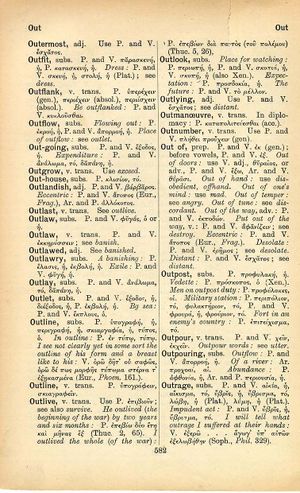outrage: Difference between revisions
From LSJ
Ἰσχυρὸν ὄχλος ἐστίν, οὐκ ἔχει δὲ νοῦν → Plebs nempe res est valida, sed mentis carens → Des Volkes Masse hat zwar Macht, doch fehlt Vernunft
(CSV4) |
m (Woodhouse1 replacement) |
||
| Line 1: | Line 1: | ||
{{Woodhouse1 | {{Woodhouse1 | ||
|Text=[[File:woodhouse_582.jpg|thumb|link={{filepath:woodhouse_582.jpg}}]] | |Text=[[File:woodhouse_582.jpg|thumb|link={{filepath:woodhouse_582.jpg}}]] | ||
P. and V. [[αἰκία]], ἡ, [[αἴκισμα]], τό, [[ὕβρις]], ἡ, [[ὕβρισμα]], τό, [[λώβη]], ἡ ( | ===substantive=== | ||
[[prose|P.]] and [[verse|V.]] [[αἰκία]], ἡ, [[αἴκισμα]], τό, [[ὕβρις]], ἡ, [[ὕβρισμα]], τό, [[λώβη]], ἡ ([[Plato]]), [[λύμη]], ἡ ([[Plato]]). | |||
P. and V. αἰκίζεσθαι (acc.), λυμαίνεσθαι (acc. or dat.), λωβᾶσθαι acc.) ( | [[impudent act]]: [[prose|P.]] and [[verse|V.]] [[ὕβρις]], ἡ, [[ὕβρισμα]], τό. | ||
[[I will tell what outrage I suffered at their hands]]: [[verse|V.]] [[ἐξερῶ… ἅγωγ' ὑπ' αὐτῶν ἐξελωβήθην]] ([[Sophocles|Soph.]], ''[[Philoctetes]]'' 329). | |||
===verb transitive=== | |||
[[prose|P.]] and [[verse|V.]] [[αἰκίζεσθαι]] (acc.), [[λυμαίνεσθαι]] (acc. or dat.), [[λωβᾶσθαι]] acc.) ([[Plato]]), [[ὑβρίζειν]] (acc. or [[εἰς]] acc.). | |||
}} | }} | ||
Revision as of 08:52, 20 May 2020
English > Greek (Woodhouse)
substantive
P. and V. αἰκία, ἡ, αἴκισμα, τό, ὕβρις, ἡ, ὕβρισμα, τό, λώβη, ἡ (Plato), λύμη, ἡ (Plato).
impudent act: P. and V. ὕβρις, ἡ, ὕβρισμα, τό.
I will tell what outrage I suffered at their hands: V. ἐξερῶ… ἅγωγ' ὑπ' αὐτῶν ἐξελωβήθην (Soph., Philoctetes 329).
verb transitive
P. and V. αἰκίζεσθαι (acc.), λυμαίνεσθαι (acc. or dat.), λωβᾶσθαι acc.) (Plato), ὑβρίζειν (acc. or εἰς acc.).

